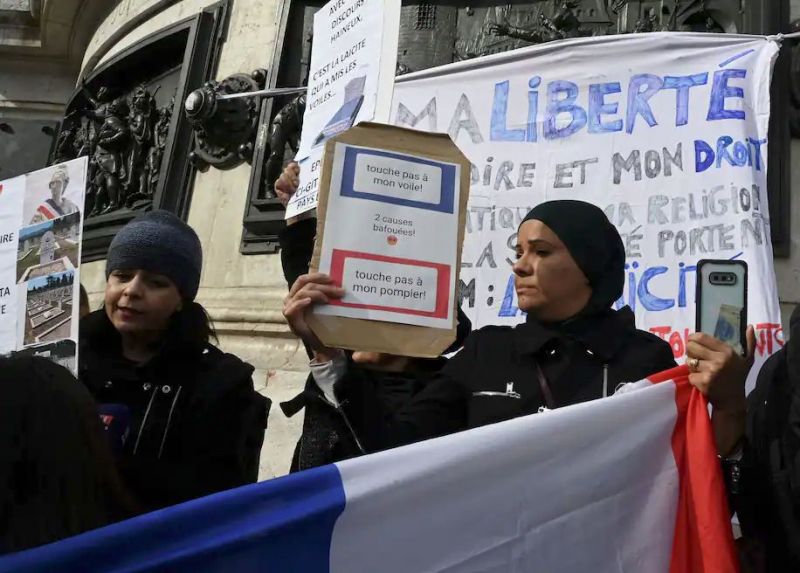
“France, the world is watching”, Muslim American Rep. Ilhan Omar (D-Minn.) posted on Instagram recently, with a video of herself wearing her religious head covering along with the viral hashtag #handsoffmyhijab. The hashtag, created by American Muslim women to support their French counterparts, spawned millions of videos on TikTok after France’s senate voted to ban children under the age of 18 and mothers who accompanied them on school trips from wearing the hijab, and to ban burkinis at swimming pools.
This global movement came in stark contrast to the silence of prominent French voices, who have said little about the new provisions that are part of a law designed to fight the “separatism” that is supposedly threatening France.
These provisions came as amendments to a bill that was previously voted on by the National Assembly and condemned by major French human rights organizations as “targeting Muslims” and “violating human rights”. Despite the outcry, the right-wing senators of the party Les Républicains decided to toughen the initial law.
The new version of the law creates new reasons to surveil Muslim citizens and restricts their freedom of religion in a way that has never been seen before.
While the secular law in place bans hijabs in schools and for civil servants only, the senate decided to ban religious signs for parents who take part in extracurricular activities, which basically means the exclusion of Muslim hijab-wearing mothers from school life.
Lawmakers also decided to forbid burkinis in swimming pools and to exclude any person wearing religious signs from taking part in a sporting event or a competition hosted by a federation or sport association. In a context where the French Football Federation is the only international body to restrict women with hijabs from participating in sport, the senate is amplifying the pressure on Muslim women who constantly face exclusion.
U.S. Olympic fencer Ibtihaj Muhammad posted on her Instagram account, “This is what happens when we normalize anti-Muslim and anti-Islamic speech and discrimination — a hijab ban that violates religious freedom. Regulating Muslim women’s bodies in the name of secularism is both Islamophobic and oppressive”. When she invited me for an Instagram live session to help her followers understand the situation in France, we were reminded that she might not have been able to be a champion if she were competing in France, where the organization Les Hijabeuses was created to fight discrimination in soccer. How can we take pride in the fact that the 2018 men’s World Cup was won by a French team composed of a large number of Muslim players, while preventing Muslim women from achieving the same goal?
On the provision that prohibits anyone under 18 from wearing a veil in the public sphere — to prevent “the wearing by minors of any outfit that would mean the inferiorization of women” — one politician who supported the point said that “it is not up to the parents to impose dogmas on children”. But this contradicts international human rights standards, which guarantee “the liberty of parents and, when applicable, legal guardians to ensure the religious and moral education of their children in conformity with their own convictions". This is all the more disturbing because the lawmakers recently set the age of sexual consent at 15.
French women soon decided to create a French version of the viral hashtag, #PasToucheAMonHijab, to protest a “discriminatory and freedom-destroying law”, as one woman wrote. More than 70,000 tweets pushed for Muslim women to be “considered fully human” and demanded that lawmakers stop “making decisions on their behalf”.
France has been discussing the outfits of Muslim women for at least three decades. In 1989, girls were excluded from middle school for wearing headscarves. Since then, France has singled itself out for an incredible number of controversies over Muslim women daring to appear covered in public. Women have been attacked and dismissed for leading a student union, being nannies, being part of a television singing contest, running for office, participating in a news show, attending a public hearing, volunteering in a charity, wearing a long skirt at school, applying for a job, being provided adequate sporting equipment, and in so many other situations. This article would not be able to name all the times when Muslim women’s choices have been violently debated without them.
The provisions received unfavorable opinions from the current government and the law commission, and French President Emmanuel Macron’s majority party in the National Assembly will probably not vote for them. But the fact that they have been approved by one of the two legislative chambers says a lot about how far lawmakers are ready to go to erase Muslim women from the public sphere. The debate, taking place without the participation of the main parties concerned, itself normalizes the exclusion of the community.
Muslim women are reclaiming their freedom over their bodies. Pretending to save them from oppression while banning them from activities is nothing more than denying them agency.
Rokhaya Diallo is a French journalist, writer and filmmaker.
